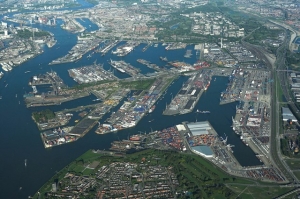


(Posted on 25/10/20)
The port of Rotterdam handled a total of 103.4 million tonnes of freight in the third quarter of 2020. Total throughput over the first nine months of the year stands at 322.3 million tonnes. This is 8.8% lower than the volume recorded in the equivalent period last year. The main throughput categories to record a decline in volumes were crude oil, iron ore, coal and mineral oil products. In contrast, the port could report an increase in agribulk volumes, with only a very modest decline in container throughput.
In comparison with the second quarter of 2020, many segments showed a marked improvement in their throughput volumes. The agribulk, iron ore and scrap, biomass and roll on/roll off categories in particular could report a strong recovery at the end of the third quarter – even to pre-Covid volumes. In addition, there was a clear increase in the number of containers put through the port in Q3 compared to the preceding quarter.
Allard Castelein, CEO of the Port of Rotterdam Authority: ‘At present, it is still too early to determine whether we have left the worst behind us in economic terms. Nevertheless, I am heartened by the revival of international trade flows and the resilience of our economy – in which the rate of recovery naturally depends to an extent on further developments in the Covid-19 pandemic. Together, the Port of Rotterdam Authority, the Dutch government and companies in our port will be able to give our economy a kick-start by stepping up their joint pace of investment. This will allow us to retain jobs, create new prosperity and help build a more sustainable Netherlands.’
To recover as quickly as possible from the economic slump while simultaneously improving sustainability in the port, the Port Authority proposes accelerating a number of investment projects. This acceleration of investment projects that are intended to increase sustainable earning power – also known as the Starter Motor project – can create thousands of new structural jobs, contribute billions to the gross domestic product of the Netherlands and substantially cut the volume of carbon emissions released into the atmosphere.
Dry bulk showed an 18.6% decline compared to the first three quarters of last year. Within this segment, biomass throughput actually increased as a result of the increased firing of this product by Dutch power stations. The growing production of electric power using solar, wind and gas has contributed to a decline in the throughput of thermal coal. Falling steel production in Rotterdam’s hinterland – particularly in Germany – has also had a negative impact on the volumes of iron ore and coke put through the port. Agribulk throughput rose as a result of increased import.
The port of Rotterdam has the greatest number of transhipment connections with other ports worldwide. This was confirmed in a report recently published by the United Nations. The port has made considerable progress in the construction of the Container Exchange Route, which is expected to become available for operational tests with vehicles in the second quarter of 2021.
In the third quarter of 2020, Rotterdam once again took new steps forward when it comes to raising the sustainability of its power network. The Port of Rotterdam Authority is the first of its kind to become a member of the Hydrogen Council, a global coalition of companies that seek to stimulate the energy transition by promoting the use of hydrogen. Contractors Tennet and Van Oord are currently laying thick submarine cables that will transport power generated by offshore wind farms to shore. In due time, this power will be used to make blue hydrogen that will allow Rotterdam’s petrochemical industry to make considerable progress on its path towards zero-emissions production.
The port has also made quite some headway in the field of digitalisation. Over 50 shipping companies have already adopted the navigation and planning tool Navigate, and by now, 95% of the Dutch barge and rail operators share their data directly with Navigate.
Euroports has announced the renewal of the concession for Terminal Rinfuse Venezia (TRV) at Porto Marghera... Read more
Contributing to the commitment of achieving net zero emissions by 2050, the Panama Canal authority has... Read more
The Saguenay Port Authority in Quebec has ordered a Konecranes Gottwald ESP.6B Mobile Harbor Crane for... Read more
North Sea Port Supervisory Body has appointed Cas König as the port authority's new CEO. Kö... Read more
After 19 years at the helm of the Port of Trois-Rivières and a career rich in major projects,... Read more
Abu Dhabi based AD Ports Group, an enabler of integrated trade, transport and logistics solutions, has... Read more
The Port of Rotterdam and Port of Antwerp-Bruges have welcomed the Clean Industrial Deal, through which... Read more
The Canadian Port of Trois-Rivières is delighted to have received major funding of $87.1 million... Read more
Belgian logistics giant Katoen Natie has ordered four all-electric Konecranes Gottwald Mobile Harbor... Read more
AD Ports Group, Abu Dhabi based enabler of integrated trade, transport and logistics solutions, has... Read more